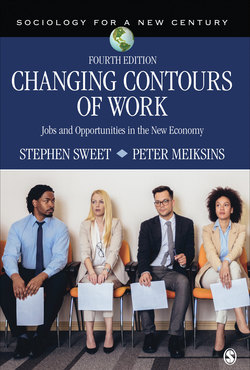Читать книгу Changing Contours of Work - Stephen Sweet - Страница 23
На сайте Литреса книга снята с продажи.
Conclusion
ОглавлениеIn this first chapter, we focused on the ways that sociological perspectives reshape the consideration of work. Our goal was simply to highlight the observation that a new economy does exist and that understanding it requires that we examine changes in culture and social structure, as well as consider how individuals and groups respond to those changes (agency). Although work is commonly considered a means to obtain a paycheck, we argue that it is much more than that. The design of work corresponds with cultural templates that guide workers to their jobs and script social roles. Workers live within social structures that allocate opportunities and construct barriers that block access to meaningful employment. And within these contexts, workers have responded both individually and collectively to manage their responsibilities and reshape society.
The stresses experienced by workers like Meg, Tammy, Emily, Rain, Kavita, and Mike are probably familiar to readers of this book. Because of the instability of jobs, changing opportunity structures, the challenges of meshing work with family, and the challenges of finding good work, many workers find themselves struggling in the new economy. One of the great contributions of sociology is its capacity to reframe these types of personal problems as being public issues (Mills 1959). In the chapters that follow, we consider the extent to which work opportunities are changing, as well as the impact these changes have on lives on and off the job. Our focus, throughout, is on identifying stress points, opportunity gaps, the ways in which workers adapt to these strains, and what can be done to close the chasms that separate workers from fulfilling jobs and reasonable conditions of employment.
